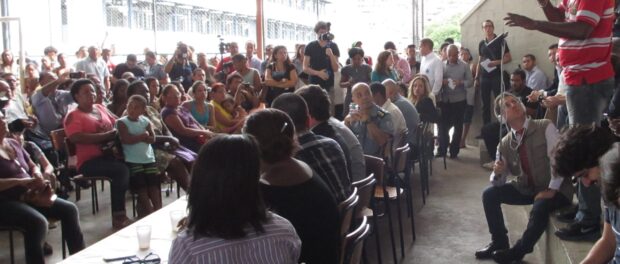
A public hearing conducted to investigate human rights violations in Complexo do Alemão took place on Monday May 4 in the community’s Caic Theóphilo de Souza Pinto School. The meeting was organized by Brazil’s Parliamentary Commission of Inquiry (CPI) after the first three months of 2015 in Alemão were filled with violent murders by the police.
The school where the meeting took place is currently used as a Pacifying Police Unit (UPP) base while the official police building is renovated. A few days after the event, the UPP coordinating body announced it will remove the base from the school.
Vestiges of shootouts between police and gangs can be seen on the school building: the main wall is covered in bullet holes. The removal of the UPP base, slated for some time this month, was one of the many demands from community leaders at Monday’s meeting.
More than 200 people attended the meeting, which was the first CPI meeting to be held outside of Brasilia. The CPI, the Human Rights and Education Commission of the Legislative Assembly of Rio de Janeiro (Alerj) and 17 community associations collaborated in organizing the event, which brought forth heated discussions about the recent spike in police violence in the community. The objective of the event, according to organizers, was to generate concrete ideas for change and for the event to allow a space where favela voices could be “heard and respected.” However, some residents left the event disappointed as only four favela residents from the audience were allowed time to speak at the end of the 3-hour event.
Representatives from the State Legislative Assembly’s Human Rights Commission, the Military Police, the State Education Department, and the State Social Assistance and Human Rights Department sat in the 12-member panel. The panel also included three community residents chosen by Alemão activist leaders.
The event ran for more than three hours. Each member of the panel was allowed time to speak in a discussion moderated by the state congressman heading Rio’s Human Rights Commission, Marcelo Freixo.
Denize Moraes, mother of a young mototaxi driver allegedly killed by the Military Police, kicked off the discussion by giving an account of her experience with the UPP and asking the government to rethink the pacification project. She said the security forces who are supposed to be protecting community members are killing them instead.
Thiago Matiolli, a researcher, followed Moraes by saying current police violence in Alemão comes from the common perception that violence is an inevitable characteristic of a favela, not a social product. This attitude comes from the institutional criminalization of poverty, he said.
Udson Freitas, representative of the Juntos Pelo Complexo do Alemão organization, added that people in the community have lost any trust they had in the authorities.
“All bases have good and bad cops. Unfortunately they bring the bad ones here and send the good ones to the South Zone,” he said.
After a resident narrated his compelling anecdote about being beaten by the police, Colonel Íbis Silva Pereira responded to all criticism by apologizing on behalf of the police forces.
“No cop is educated to punch someone in the face; zero, none of us has that type of training,” he said. “But that does not mean it doesn’t happen in real situations, so I want to apologize for that.”
Marquinhos Pepé, president of the Resident’s Association of Palmeiras, said he initially supported the UPP pacification project. However, he said, now it’s evident that the UPP brings violence to the community if it is not accompanied by other social projects.
Teachers Matheus Mendes and Guilherme Moreira from the Caic Teophilo da Souza school said the arrival of the UPP has had negative effects on students’ and teachers’ safety and attendance. Moreira revealed that before the UPP was implemented 1,400 students attended the school, a number that has fallen to 700. The UPP base that will soon be removed from school grounds has been a factor in this decrease in attendance.
“We either keep the school or the UPP, because it is not possible for both to coexist,” Moreira said.
The panel was interrupted several times by frustrated audience members who wanted to recount their own experiences with police brutality. However, most of the time was taken up by the political representatives on the panel. At the end of the hearing, four selected audience members—community activist Mariluce Mariá, representative of Instituto Raízes em Movimento Alan Brum Pinheiro, community activist Leonardo Souza, and resident Andre Luiz Fernandes—were given the microphone to voice their concerns and demands.
Mariá said she enjoyed the event and found it extremely symbolic for the community. However, she admitted that many left unsatisfied with the lack of audience participation.
“When a resident receives notice about a hearing like this one, they understand they should come to speak, that everyone can speak,” she said. “That is why people were angry. The majority of the audience were moms of the students here, and they all had something to say.”

